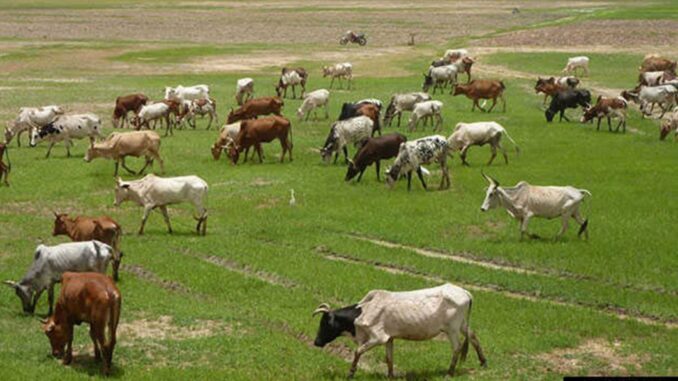
Against the background of rising tension being generated among ethnic groups all over the country following incessant clashes between farmers and cattle herdsmen, the suggestion by Kano State Governor, Abdullahi Ganduje, for a federal law to ban movement of cattle across states deserves a deep appreciation.
The governor, who is from the part of the country where herding is a major occupation obviously is mindful of the fact that the frequent clashes portray danger, and a possible beginning of internal strife, the end of which no one can predict.
No matter the divergence of views regarding what will constitute an enduring solution to the herdsmen issue that has pitched sections of Nigeria against other sections, it is clear that so long as herds of cattle are free to roam the country, including on farmlands, it is a question of time before the bubble burst. Going by recent incidents in many states, including the interventions by the Governor of Ondo State and Sunday Adeyemi (aka Sunday Igboho) in Oyo State, Nigeria has no time on her side to resolve the matter.
Ganduje’s suggestion is fundamental but it is far from being universally accepted. Already, voices from the Senate are indicating that such a law would be viewed by some people as unconstitutional, having regard to the provision that allows every Nigerian freedom of movement, and freedom to live anywhere in the country. The discordant tunes must, however, take cognizance of the fact that freedom, even those guaranteed by the constitution, is never absolute; and is contingent on the rights of other Nigerians to peaceable enjoyment of their life.
Indeed, the law proposed by Ganduje can very well fall into the category of laws envisaged under Section 45 of the 1999 Constitution, in furtherance of public order, public safety, public health, security and other essentialities. In any event, the government, particularly the governors, have the power to make laws guiding various aspects of the
life of Nigerians, including indigenes of their states, living or working within the states’ geographical entity.
In resolving the present crisis and tension, notable people have emphasized the necessity of not mixing up criminal elements with the totality of an ethnic group. For instance, while it indisputable that the killer herdsmen who have been widely fingered in using their cattle to destroy farmlands, attack farmers, kidnap, rape and even kill their victims are mainly of the Fulani stock, care should be taken against inference that every Fulani herdsman or of other occupations is a killer or criminal of sorts. The task for all the governors, people who are being terrorised as well as stakeholders representing the Fulani is to separate the whiff from the chaff; identify the real culprits and bring them to book properly in a way that will send the right signal to prospective other criminals.
It must be pointed out that the greatest danger facing this country today is not from the killer herdsmen or kidnappers; nor is it from the farming communities who have been complaining and now taking some practical measures to safeguard themselves. The real danger is the absence or near absence of government to perform its basic duty of securing the people and protecting their welfare. Probably nowhere in the world has a government such as the Federal Government that superintends all the apparatuses of national security, abdicated its responsibility in such an appalling manner; as if there is nothing at stake.
It is most distressing that majority of Nigerians are painfully coming to terms with a notion that if the Muhammadu Buhari presidency is not a mastermind or beneficiary of the present national malaise, then it is absolutely incapable of resolving it. The fact that some Nigerians are already taking laws into their hands to protect themselves in many parts of the country is an impeccable testimony to that thinking, and the president and his entire cabinet stand deeply indicted.
A lot of damage has been done and is still being done. But the country has not disintegrated. Therefore, it is not late for the government to wake up from its slumber. Given that the Federal Government has shown no inclination to be concerned about the precipice in which the country is hanging, state governors must recognise that their holiday is over. For the first time since 1999 when the country started its current democratic dispensation, the governors are facing the real test of governance.
If any governor ever thought that his rule was no more than presiding over state executive meetings and sharing money to execute both important and flamboyant projects, that thought should perish. Sadly, only about a couple of governors have demonstrated their appreciation of the situation confronting their states and Nigeria; and shown the courage to lead. It is no longer fashionable for governors to keep lamenting their helplessness or that they do not control the agencies for law and order. They must take the bull by the horns, and act fast before the country plunges deeper into the crisis.
As an addendum to Ganduje’s suggestion, which he believes is the antidote to farmers-herders conflicts and cattle rustling, all the governors must agree on ranching as the way to go in enthroning a peaceful environment for both farmers and herders. When that is established, it will be easier to identify and flush out killers and kidnappers who will then have no excuse to be lurking in the bush, save of course to perpetrate devilish agenda.
Additionally, Nigeria can no longer continue to run away from the challenges of desertification, which provides an easy excuse for roaming the cows. The loss of forest and rich grasslands across the country can be reversed with a political will and sincerity of purpose by the ruling class. Even school children can be successfully deployed to achieve a holistic dream of keeping the country green and flourishing with vegetation.
END

Be the first to comment